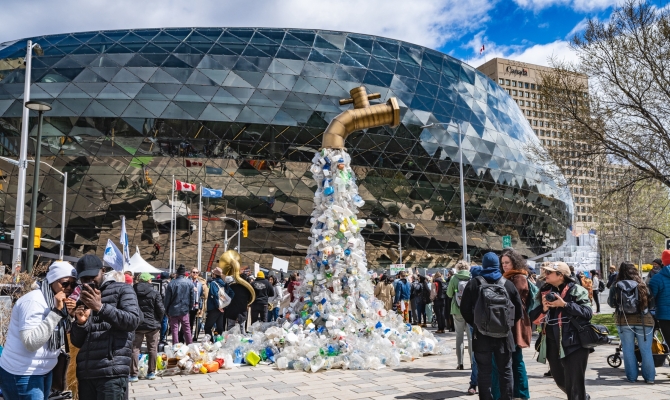
23 April 2024, Ottawa Canada - Canada, the host country of the fourth Intergovernmental Negotiating Committee to develop an international legally binding instrument on plastic pollution, including in the marine environment (INC-4), is showing the way in global efforts to end the scourge of plastic pollution.
As Pacific delegations join more than 2,000 delegates at the Shaw Centre in Ottawa on the first day of INC-4, Canada’s Minister of Environment, Hon. Steven Guilbeault, who opened the meeting reminded that the current trajectory for plastic pollution points to a legacy of environment disaster for future generations. Action to change the current trajectory is needed now.
"A whole-of-society approach for the development and implementation of a global deal to end plastic pollution is crucial. This means engaging with all levels of government as well as the private sector, non-governmental partners, the science community and Indigenous partners to ensure that all voices and perspectives are considered,” he said.
Statistics tell us that the world produces more than 350 million metric tons of plastic waste every year. Most of this plastic waste clogs waterways, chokes biodiversity, and its component chemicals leak into soil, waterways and groundwater.
Studies have also found mounting evidence showing the effects of plastic on human, animal health and the environment. Pacific communities who contribute a measly 1.3per cent to global plastic pollution are placed at the forefront of these impacts.
And while these frightening and unacceptable statistics continue to be uncovered, the industry responsible for the production and manufacture of virgin plastic and single-use plastic products continues to thrive, with more plastic produced in the past 10 years than ever before.
“We have become reliant on the disposable consumer culture, and it created a throw-away generation. We are here today because we recognise that we must throw away this throw-away generation,” Minister Guibeault told the opening session of INC-4.
“We need to forge a new global consensus that ends the costly, inefficient and the harmful wasteful plastics. We need to meet our mandate to land a deal by the end of the year. It’s not about the ‘if’ but about ‘how.”
The answer to the question will not be easy. The fourth session of the INC follows INC-1 in Punta del Este, Uruguay, in November 2022, INC-2 in Paris, France, and the INC-3 in Nairobi, November 2023, where the goal was to agree on a first draft of a plastics treaty. This did not happen.
In Nairobi, negotiations broke down in the last days of the meeting, and delegates could not agree on essential details such as what constitutes the life cycle of plastic or on whether to put a cap on plastic production.
A revised draft text of the international legally binding instrument on plastic pollution has since been released, and will be under the microscope this week. World leaders have set a target to conclude treaty negotiations by the end of 2024 at the fifth INC in Busan, Korea.
Time is not on their side.
“We have a once in a generation opportunity in front of us, it is imperative that we get it right. We need to be ambitious and we need to be effective,” said Minister Guibeault. “We must make history here in 2024, let us all together make our discussions count.”
"Canada looks forward to collaborating with all countries to drive substantial progress in the agreement text by the end of INC-4.”
Canada is walking the talk. One of the ways it is moving to answer the question of how is the creation of a national registry to track plastic production and pollution, similar to how the country already tracks greenhouse-gas emissions.
The initiative was announced this week, one of many local initiatives Canada will showcase as delegates from all over the world gather to make progress on a global plastics treaty.
Statistics Canada reported that in 2019, 6.2 million tonnes of plastic was produced in Canada, more than one-third of it for packaging alone. Canada also estimates that more than four million tonnes of plastic ends up as waste each year, and less than one-tenth of that is recycled.
The national registry to track plastic production and pollution is designed to address this. How it works is that companies that produce or import plastic in Canada will have to report every year how much of it they are putting on the market, along with how much plastic waste they generate. That includes reporting on how much they send for recycling or reuse, versus how much is simply tossed out.
"What we're aiming to do with this registry is to ensure that there's more transparency in Canada on the production and use of plastics," Minister Guilbeault said when the scheme was launched this week. "It is hard to tackle a problem if you don't know what it is, where it is, what's being used."
The registry will start with plastic packaging, electronics and single-use items, and eventually expand to include plastic resins, tires and plastic products for agriculture.
The fourth Intergovernmental Negotiating Committee to develop an international legally binding instrument on plastic pollution, including in the marine environment is taking place in Ottawa, Canada, from 23-29 April 2024.
The Pacific Islands are represented by the Cook Islands, Federated States of Micronesia, Fiji, Kiribati, Marshall Islands, Nauru, Niue, Palau, Papua New Guinea, Samoa, Solomon Islands, Tonga, Tuvalu and Vanuatu through the support of the Government of Australia and the United Nations.
They are supported by the Secretariat of the Pacific Regional Environment Programme (SPREP), working with partners the Pacific Islands Forum Secretariat (PIFS), Office of the Pacific Ocean Commissioner (OPOC), The Pacific Community (SPC), Forum Fisheries Agency (FFA), Environmental Investigation Agency (EIA), Centre for International Environmental Law (CIEL), University of Wollongong, WWF and Massey University.
For more information, visit: https://www.unep.org/inc-plastic-pollution/session-4